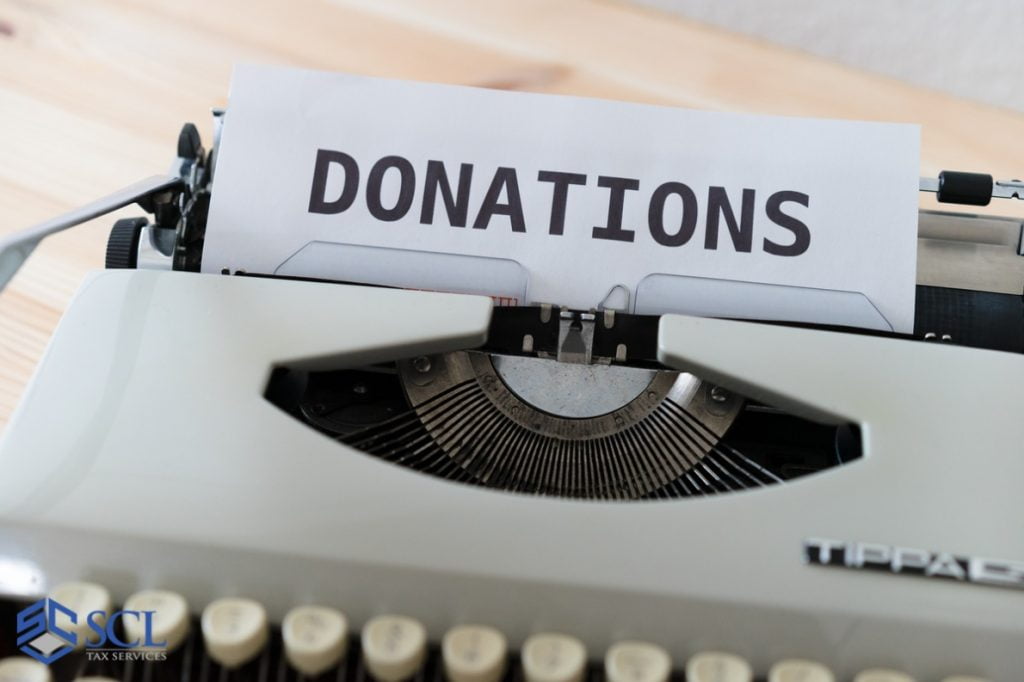A tax-deductible donation is a contribution of money or goods to a tax-exempt organization, such as a charity. Contributions can lower your tax liability and lower the possibility of facing IRS trouble. You can claim Tax-deductible donations on your taxes if you itemize on Schedule A of IRS Form 1040 or 1040-SR.

During the 2021 tax year, taxpayers can deduct up to $300 of cash donations without itemizing. This means a married couple filing jointly could deduct up to $600 of donations without itemizing. The deduction is known as an “above the line” deduction.
To get the advantages of charitable tax deductions, count on our tax professionals. We can also help you with business taxes, bookkeeping services, and even payroll service. Get in touch with our tax office and start talking with a tax accountant and if you want to learn more about these deductions, read on.
Generally, you may deduct up to 60% of your adjusted gross income from charitable contributions, but depending on the type of donation and the organization (contributions to certain private foundations, veterans organizations, fraternal societies, and cemetery associations may have lower limits). you can find details in IRS Publication 526.
As a general rule, itemize your taxes. If you want to claim tax deductions for charitable donations, you must itemize your deductions when you file your taxes. You need to include Schedule A with your tax return.
Before making a decision, weigh the pros and cons. If you itemize your deductions, it may take more time and may require more expensive tax software or create a higher bill from your tax preparer. Plus, if your standard deduction is greater than the sum of your itemized deductions, you may be better off abandoning itemizing and taking the standard deduction instead. Nonetheless, if you abandon itemizing, you cannot deduct what you donated.
Here are the standard charitable deduction amounts by filing status. $12,950 for single filers, $25,900 for married couples, and $19,400 for the head of household.
You might want to skip itemizing (and thus claiming those tax-deductible donations) if your standard deduction exceeds your itemized deductions.
As this could be complicated, we suggest working with a certified tax consultant. SCL Tax Services in & near Bronx, NY, is more than happy to help you deduct your taxes.

Charitable tax deductions come with many ifs and buts, so we’ve gathered these tips to help you deduct as much as possible.
If you want your donation to be deductible, it must be made to an IRS-approved nonprofit organization. Often, these are charitable, religious, or educational organizations, though they can be anything from your local fire department to an organization that prevents cruelty to animals.
To deduct cash contributions, regardless of their amount, you need a canceled check, bank statement, or receipt with the charity’s name and donation amount. If you want to deduct your donations, you cannot put cash in a church collection tin or in a Salvation Army bucket.
Timing is key in all deductions. Contributions can be deducted in the year that they are made.
In addition, there is a limit on how much you can deduct. A general rule is that you can’t contribute more than 60% of your adjusted gross income (AGI) to qualified public charities, colleges, and religious groups (100% of AGI for qualified charities in 2020).
It is also important to remember that you cannot write off a contribution if you receive something in return.
For example:
The most tax-saving option may not be cash but appreciated property, such as securities, real estate, art, jewelry, or antiques.
Say you own stock that you purchased for $1,000 many years ago, and it is now worth $10,000, and you would like to donate that $10,000 to a major fundraiser for your alma mater. If you write a check for $10,000, your college will receive $10,000, and you will get to deduct $10,000.
If, instead, you give the $10,000 worth of stock,

When donating tangible personal property, how the charity uses the item affects how much you can deduct.
A formal appraisal is required if the property is worth more than $5,000 ($10,000 if the stock is held by a closely-held company). You should also make sure the appraiser is a member of a recognized professional group or meets minimum education and experience requirements. If not, the IRS may deny your deduction.
With us, you won’t have to worry about taxes anymore. Our tax professionals know the ins and outs of tax laws, so contact us and put your trust in SCL Tax Services in & near Bronx, NY. Call us at 347-305-4348!
If it was helpful, please leave us a 5star review. It would help us a lot. Thanks!
We are here to relieve you of the tax pressure by offering a wide range of Tax Services In & Near Bronx, NY. If you need expert advice or need us to complete your taxes, we will provide it for you. We know you work hard, so we work hard to serve your needs.
Your time is valuable, which is why we are here for you.